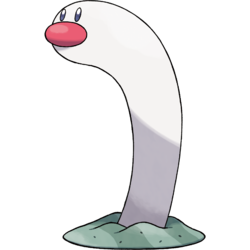From Bulbapedia, the community-driven Pokémon encyclopedia.

|
The subject of this article is a Pokémon which has recently been announced.
This article's contents will change as more information becomes available, perhaps abruptly. Please be cautious when adding information to this article, as rumors and speculation can often be confused with facts. Avoid any information on this subject which is not confirmed by reliable sources.
|
Wiglett (Japanese: ウミディグダ Umidigda) is a Water-type Pokémon introduced in Generation IX.
It evolves into Wugtrio starting at level 26.
Biology
Wiglett is a long, white Pokémon that seems to be perpetually buried within the earth, leaving only its head and part of its body visible. It has beady dark blue eyes and a large, round, pink nose. Although Wiglett has a stated Pokédex height, it is unknown how long it really is underneath the sand, or what the rest of its body looks like.[1]
Wiglett lives in beaches and seas, where it burrows into beach sand.[2] It pokes part of its body out of the ground to feed. Wiglett has an exceptional sense of smell, which has a range of over 60 feet (20 meters). Wiglett is a timid and cautious Pokémon; it hides in the sand when it picks up the scents of other Pokémon, such as Veluza, nearby.[1]
Some researchers initially confused Wiglett for a Paldean regional form of Diglett due to their physical resemblance, but they are separate species and differ in habitat and diet. It is theorized that the two species ended up having similar body plans as an adaptation to suit their environments and burrowing behavior.[1][2]
In the anime
Major appearances
Minor appearances
In the manga
In the TCG
- Main article: Wiglett (TCG)
Game data
Pokédex entries
| This Pokémon was unavailable prior to Generation IX.
|
| Generation IX
|
|
|
Paldea
#288
|
| Scarlet
|
This Pokémon can pick up the scent of a Veluza just over 65 feet away and will hide itself in the sand.
|
| Violet
|
Though it looks like Diglett, Wiglett is an entirely different species. The resemblance seems to be a coincidental result of environmental adaptation.
|
|
|
Game locations
| This Pokémon was unavailable prior to Generation IX.
|
|
|
In side games
Held items
Stats
Base stats
| Stat
|
Range
|
| At Lv. 50
|
At Lv. 100
|
10
|
|
70 - 117
|
130 - 224
|
55
|
|
54 - 117
|
103 - 229
|
25
|
|
27 - 84
|
49 - 163
|
35
|
|
36 - 95
|
67 - 185
|
25
|
|
27 - 84
|
49 - 163
|
95
|
|
90 - 161
|
175 - 317
|
Total: 245
|
Other Pokémon with this total
|
- Minimum stats are calculated with 0 EVs, IVs of 0, and (if applicable) a hindering nature.
- Maximum stats are calculated with 252 EVs, IVs of 31, and (if applicable) a helpful nature.
|
Type effectiveness
| Under normal battle conditions in Generation IX, this Pokémon is:
|
|
|
|
|
|
|
|
|
|
|
|
|
Learnset
|
|
|
|
- Bold indicates a move that gets STAB when used by Wiglett
- Italic indicates a move that gets STAB only when used by an Evolution of Wiglett
|
|
|
|
|
- Bold indicates a move that gets STAB when used by Wiglett
- Italic indicates a move that gets STAB only when used by an Evolution or an alternate form of Wiglett
|
|
|
|
|
- Moves marked with an asterisk (*) must be chain bred onto Wiglett
- Bold indicates a move that gets STAB when used by Wiglett
- Italic indicates a move that gets STAB only when used by an Evolution of Wiglett
|
Side game data
Evolution
Sprites
Trivia
- Wiglett was revealed on September 28, 2022, on a mock webinar titled "World Pokémon Ecological Society".[2]
Origin
Wiglett appears to be based on garden eels. The fact that it physically resembles Diglett may be a reference to convergent evolution or parallel evolution, which can lead to separate organisms independently developing similar or identical characteristics and body plans.
Name origin
Wiglett may be a combination of wiggle, water or white, and Diglett.
Umidigda may be a combination of 海 umi (sea) and ディグダ Digda (Diglett).
In other languages
| Language
|
Title
|
Meaning
|
 Japanese Japanese
|
ウミディグダ Umidigda
|
From 海 umi and ディグダ Digda
|
 French French
|
Taupikeau
|
From Taupiqueur and eau
|
 Spanish Spanish
|
Wiglett
|
Same as English name
|
 German German
|
Schligda
|
From Schlick and Digda
|
 Italian Italian
|
Wiglett
|
Same as English name
|
 Korean Korean
|
바다그다 Badageuda
|
From 바다 bada and 디그다 Digda
|
 Mandarin Chinese Mandarin Chinese
|
海地鼠 Hǎidìshǔ
|
From 海 hǎi and 地鼠 Dìshǔ
|
 Cantonese Chinese Cantonese Chinese
|
海地鼠 Hóideihsyú
|
From 海 hói and 地鼠 Deihsyú
|
|
|
|
|
|
|
|
Related articles
References
External links

|
This Pokémon article is part of Project Pokédex, a Bulbapedia project that aims to write comprehensive articles on each Pokémon species, as well as Pokémon groups and forms.
|




